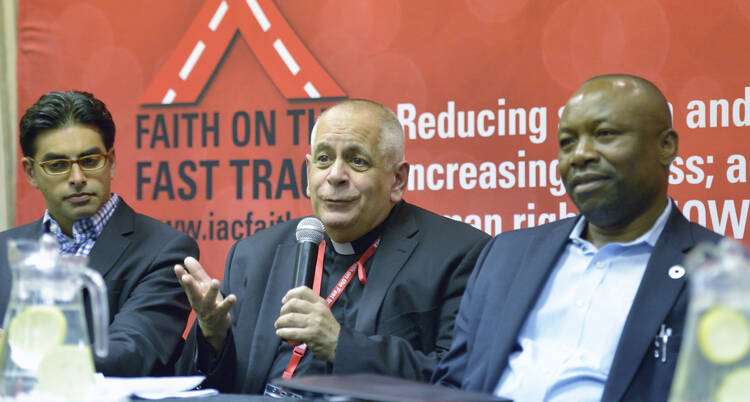Beyond the hype and celebrities—Prince Harry, Elton John, Bill Gates and Charlize Theron among them—the 21st International AIDS Conference was recently held in Durban, South Africa, on July 18-22. AIDS 2016 was an opportunity for healthcare professionals and AIDS activists to meet, strategize and reveal new treatments in the struggle against the most prominent global plague of our era. As one who has worked part time in medical ethics education for over 10 years, a number of findings struck me as significant.
First, a new antiretroviral (A.R.V.) drug, dolutegravir, was widely discussed. Its advantages are many. It has fewer side effects than most comparable A.R.V.s and clinical trials suggest that the persons taking them do not develop much resistance to them, as has happened with other A.R.V.s. It is also a slow-release drug, meaning that it is possible, though not advisable, to skip taking it once or twice without undermining treatment. A single dose’s effect can be found in the body for up to 72 hours after taking it.
Less optimally, for South African patients at least, most of whom receive A.R.V.s in state-funded hospitals and clinics, is that dolutegravir is only available at the moment in private care facilities. There is hope that when the cheaper, generic version of dolutegravir is produced it will reach the public health sector.
Another development discussed is the introduction of long-term injectable A.R.V.s that could be administered every few months, obviating the risk of patients missing their daily dose and undermining their treatment. This is an important development since, as with many cases of people on chronic medication, the evidence is that failing to keep up daily treatment is high. Some studies presented at the conference show that pregnant women who take A.R.V.s during pregnancy frequently give up taking their medication after birth, and that the recidivism rate among teenagers on A.R.V.s is also unacceptably high.
Treatment as prevention was another key feature of the conference. In many places, H.I.V.-diagnosed persons would go onto A.R.V.s once their CD4 blood cell counts reached a determined level. The current view gaining momentum is that they should go on A.R.V.s the moment they are diagnosed. This is particularly useful in cases of “discordant” couples, where one partner is H.I.V.-positive and the other not.
Amidst the new developments in the science combating AIDS, some disturbing features continue to appear. According to experts at the conference, the risk of H.I.V. has not altered sexual behavior significantly, especially in the global AIDS hub of southern Africa.
H.I.V. infections continue to occur as a result of “lifestyle” choices. There is a trend, some researchers reported, of younger women being infected by men over 30, who were themselves infected by women of their age group. In southern Africa in particular, and despite H.I.V. risks, there is a subculture of “sugar daddies” and “blessers”—older men who seek out younger women as sexual partners, whether on a long term or casual basis. The young women frequently get involved in these relationships for economic reasons, whether out of poverty or a desire for otherwise unattainable luxury goods. There is no sign of a change in this phenomenon.
This raises the wider issue of prevention through sexual abstinence and fidelity to one partner. Although the global healthcare community has agreed that these are the best single ways to reduce H.I.V. infection, it has acknowledged that for various reasons it is not happening at a level to make it effective. Religious health care providers are in a particular dilemma here, particularly communities like the Catholic Church that oppose the use of condoms because of their contraceptive effect.
At a pre-conference meeting of Catholics engaged in H.I.V. prevention and care, this dilemma was the largely unspoken shadow looming over what was a justifiable celebration of church involvement. The Catholic Church’s health system, in Africa in particular, is the largest single non-state provider of H.I.V. care in the world. Presenters, mainly from Africa, recounted the sterling work the church has done. Only at the end of the meeting, which included talks on H.I.V. care as an aspect of Catholic Social Teaching, and on drawing on traditional themes of moral theology to equip Catholic health care professionals in decision-making, did one figure, an African doctor based in an international organization in the United States, say what many were thinking. How do we do our medical job effectively, in collaboration with our global health partners, and stay true to the official teachings of the church in some areas?
A very good question, I thought, one that demands a more open and frank discussion between health care professionals, ethicists and the hierarchy than we have had. It struck me that traditional moral theology had the resources to engage the question but that out of fear we had kept silent.
Ironically, our silence had led to a global crisis that make gatherings like this year’s International AIDS Conference essential.
Anthony Egan, S.J., is one of America's Johannesburg correspondents.








